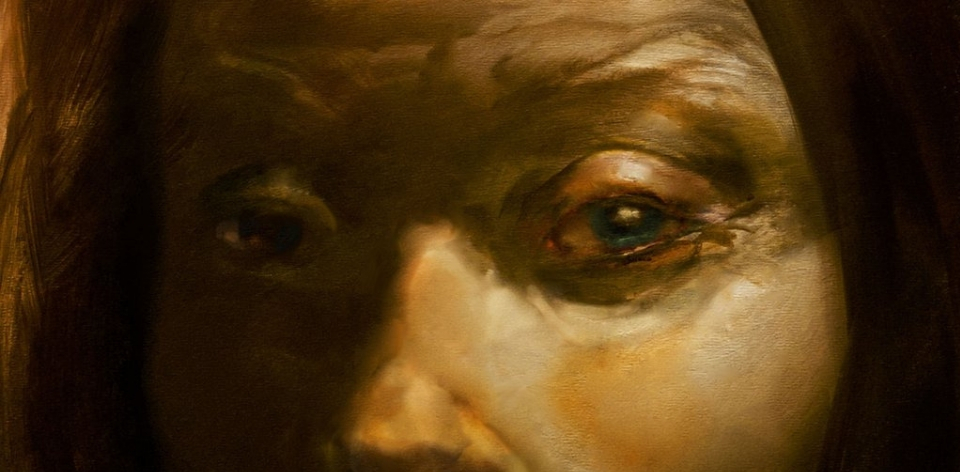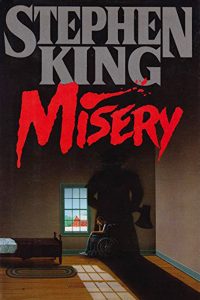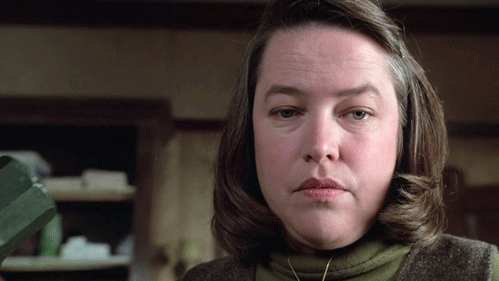Image credit: Rick Berry for Suntup Editions
Welcome back to the feature column that explores a decent number of Stephen King’s books in the order they were published! (More or less!)* Fair warning: there will be spoilers ahead.
Here’s a bit of a cockadoodie controversial opener for you: MISERY might be one of Stephen King’s best novels.
If Danse Macabre was Stephen King’s first attempt to understand his connections with horror and writing, then 1987’s MISERY was the closest thing to autobiography until On Writing. Published at what was arguably the height of his productivity, sandwiched in a matter of months between The Dark Tower II: The Drawing of the Three and The Tommyknockers, it tackles addiction, obsession, and the inner life of a writer.
Notoriously inspired by fan reaction to his underrated 1984 fantasy novel The Eyes of the Dragon – which was incidentally one of my first encounters with King – the novel is partly a reaction of a writer who felt shackled to horror. “In late 1985 and early 1986 I wrote Misery,” King describes in On Writing. “[T]he title quite aptly described my state of mind.” He later adds a dream he had on a flight to London about a psychotic fan holding a writer captive, and the rest is literary history.

Thanks largely to the 1990 Rob Reiner film starring Kathy Bates and James Caan, the basic plot of MISERY has permeated our collective memories. Writer Paul Sheldon has enjoyed a successful run of historical romance books featuring the titular Misery Chastain, but he’s finally killed her off and written what he thinks is his first “real” novel, Fast Cars.
Making a boozy decision to drive to Los Angeles rather than fly to New York, he has a car accident in Colorado (in a familiar location) and wakes up in the care of Annie Wilkes, a former nurse and Paul’s “biggest fan.” While a snowstorm is initially blamed for his captivity, it soon becomes clear that Annie has no intention of letting him go until she gets the story she wants to read.
King’s control of the darker parts of our imaginations is masterful, yet his best stories focus on the evil (and sometimes good) that humans do. The Shining may have psychic elements, but it’s ultimately about the ghosts who “live inside us, and sometimes…win.” Annie Wilkes is mentally ill, obsessed and completely divorced from reality, but there’s nothing supernatural about her sudden bouts of depression, violence, and paranoia.
Yet King goes one step further with MISERY by showing how much of an active participant Paul becomes. While he’s not the first writer in King’s works – notably preceded by Ben Mears (‘Salem’s Lot) and, of course, Jack Torrance (The Shining) – here it feels more confessional. Paul’s initial driving force is getting his drug fix, a carefully portioned set of pain meds Annie keeps locked away. Later, it’s the writing of the novel-within-a-novel (“Misery’s Return“) that keeps him hooked long after his body and mind are broken.
The Constant Reader, name-checked in the book … is also us … so we are complicit in everything that comes next.
Which is where it gets to the core of King’s oeuvre, as Paul lays down his best work: a dark Gothic departure from his previous releases (“more dependent on plot than on situation”), a process that threatens to consume him. There’s the oft-repeated in-text analogy to Scheherazade, the female frame narrative in One Thousand and One Nights who is literally telling stories to save her life. Here Paul gradually comes to realise “he had been his own Scheherazade.” This is the kind of horror I adore: psychological terror filled with crumbling inner worlds, where the external threat is only matched by the protagonist’s spiralling mental break. The Constant Reader, name-checked in the book in reference to Annie, is also us: “we” pushed King to this place in demanding more horror, so we are complicit in everything that comes next.
Even if you haven’t read the book, it would be difficult to dip into the inky depths of this book without at least briefly mentioning That Scene. The “hobbling” as portrayed in the 1990 film is brutal and without warning, an icon of the era’s genre filmmaking. Yet on page it is a masterful slice: a bloodier, more emasculating, and literal taking of flesh as penance for Paul’s perceived slights against Annie. So devastating is the removal of Paul’s foot, built up over several pages of tension and screaming, that it may require a moment’s breath. King provides us with a section break as a yield point – that is, if you can tear your eyes away from the page.
King very nearly took the ending in a very different direction when it was under the working title of The Annie Wilkes Edition, ending with a titular copy of the book bound in Paul’s skin. Yet King ultimately felt that would have missed his own point. “[H]is efforts to play Sheherezade and save his life gave me a chance to say some things about the redemptive power of writing that I had long felt but never articulated,” he said years later, reflecting on the published version in On Writing. It’s probably a good thing that King didn’t go that way.
One of Sheldon’s books would later turn up in Rose Madder, and Annie Wilkes herself is set for an appearance in the second season of Castle Rock (and the latter prompted this re-read). There are other connections to King in here, not least of which is an overt reference to the Overlook Hotel. After all, it all takes place not too far from Sidewider, Colorado. Paul’s mother grew up across the road from Mrs. Kaspbrak, possibly the mother of Eddie from It. Of course, years before The Dark Tower did so, King has effectively written himself into the narrative, working out his as-yet-unresolved addictions through his avatar of Paul Sheldon. “The reason authors almost always put a dedication on a book,” Paul tells Annie, “is because their selfishness even horrifies themselves in the end.”
In fact, King’s insights border on the prophetic as the book reaches its thrilling conclusion. “There was yet another novelistic roundness in this denouement,” King writes in the final section of the book, and the same is true of his real life. On 19 June 1999, King was almost killed when struck by a van near his home. The pain of recovery meant that he could only sit for short bursts, making writing difficult. During the process he wrote the self-reflective On Writing and only a few years later he completed the final three books in The Dark Tower saga, writing himself into the tale. Having maintained his high level of output ever since, and the redemptive power of writing very much keeping him in the land of the living, perhaps King has become a Sheherezade to himself as well.
So this ‘reading Stephen King in chronological order’ went off the rails a bit this year. Adaptations of Pet Sematary, Doctor Sleep, as well as Annie Wilkes and the Merril family appearing in Castle Rock: Season 2, have necessitated I jump ahead a little. From December, we’ll be back to normal. However next month: Needful Things.






